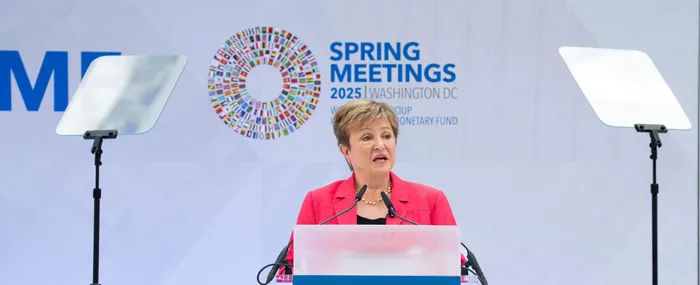IMF urges emerging markets to maintain exchange rate flexibility amidst global pressures
GLOBAL ECONOMY

IMF managing director, Kristalina Georgieva, delivering her Curtain Raiser speech in person on Thursday, April 17 at the IMF/World Bank Spring Meetings in Washington D.C.
Image: Supplied
The International Monetary Fund (IMF) has urged emerging market economies and countries with unsustainable public debt, many of whom are in Africa, to preserve exchange rate flexibility and move proactively to restore sustainability amidst prevailing global economic uncertainty.
This comes as the IMF warned that its latest World Economic Outlook, to be released on Tuesday, will include notable markdowns in growth projections, but not recession, as well as markups to the inflation forecasts for some countries.
IMF managing director, Kristalina Georgieva, on Thursday said the resilience of low economic growth and high debt was being tested again by the reboot of the global trading system.
Delivering her curtain raiser speech at the IMF/World Bank Spring Meetings in Washington D.C., Georgieva said trade distortions—tariff and nontariff barriers—have fed negative perceptions of a multilateral system seen to have failed to deliver a level playing field.
Georgieva said financial market volatility was up, and trade policy uncertainty "was literally off the charts".
"This feeling of unfairness in some places feeds the narrative: we play by the rules while others game the system without penalty. Trade imbalances stir trade tensions," she said.
"Putting together all the recent tariff increases, pauses, escalations, and exemptions, it seems clear that the US effective tariff rate has jumped to levels last seen several lifetimes ago. As the giants face off, smaller countries are caught in the crosscurrents.
"China, the EU, and the United States—despite having relatively low imports to GDP—are the world’s three largest importers. Key implication? Size matters—their actions impact the rest of the world.
"Smaller advanced economies and most emerging markets rely more on trade for their growth, and are thus more exposed, including to tighter financial conditions. Low-income countries face the added challenge of collapsing aid flows as donor countries pivot to dealing with domestic concerns."
As a result, Georgieva said the complexity of modern supply chains meant imported inputs fed into a broad range of domestic products as the cost of one item can be affected by tariffs in dozens of countries.
She said that tariffs, like all taxes, raised revenue at the expense of reducing and shifting activity—and evidence from past episodes suggested higher tariff rates were not paid by trading partners alone, with importers paying some part through lower profits, and consumers pay some part through higher prices. By raising the cost of imported inputs, tariffs act upfront.
According to the World Trade Organisation, the volume of world merchandise trade is likely to fall by 0.2% in 2025 under current conditions. The decline is expected to be particularly steep in North America, where exports are forecasted to drop by 12.6%.
However, severe downside risks exist, including the application of “reciprocal” tariffs and broader spillover of policy uncertainty, which could lead to an even sharper decline of 1.5% in global goods trade and hurt export-oriented least-developed countries.
Georgieva said all countries must redouble efforts toput their own houses in order, saying there was no room for delay in reforms to enhance economic and financial stability and improve growth potential in a world of higher uncertainty and frequent shocks.
"Economies face the new challenges from a weaker starting position, with public debt burdens that are much higher than just a few years ago," she said.
"As such, most countries must take resolute fiscal action to rebuild policy space, setting out gradual adjustment paths that respect fiscal frameworks. Some countries, however, may experience shocks necessitating renewed fiscal support; this, if it must be provided, should be targeted and temporary.
"Emerging market economies should preserve exchange rate flexibility as a shock absorber. Policymakers can look to the IMF’s Integrated Policy Framework for insights on how and when temporary measures may be warranted.
"Tighter budget constraints will entail difficult choices everywhere—but nowhere more so than in low-income countries. Countries with unsustainable public debt should move proactively to restore sustainability, including in some cases by taking the difficult decision to seek debt restructuring.
"I am very pleased to mention that the Global Sovereign Debt Roundtable will soon publish a playbook for country authorities considering debt restructuring—to help decision-making."
BUSINESS REPORT
